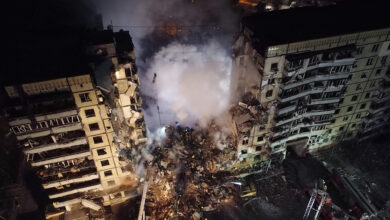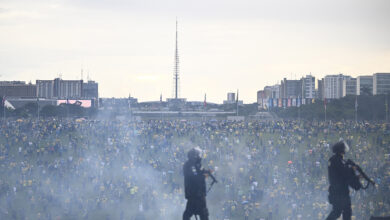Some 20,000 workers went on strike at the state-owned Mahalla Textile Company on Wednesday morning, despite warnings from the Supreme Council of the Armed Forces against labor protests. An army tank is strategically stationed outside the main gate of this massive industrial complex and several hundred textile workers are protesting within for improved working conditions, rights and wages.
The workers announced an open-ended strike and chanted against administrative corruption, but their demands are not politicized.
In response, the company's administrative board announced a factory lock-out and a paid holiday from Thursday to Saturday. The company's security workers unsuccessfully struggled with the employees to keep the gates shut.
"Their aim is to thwart our strike, to shut the gates and to keep us outside to prevent us from protesting," said a worker who asked to remain anonymous.
Meanwhile military police have been turning away Egyptian and foreign journalists from the premises and forcing them to erase any photos. A military police captain told Al-Masry Al-Youm that journalists must get written permission from military intelligence to enter.
The recurring strikes led by workers at the Mahalla Textile Company–in December 2006, September 2007, and a thwarted strike in April 2008–have motivated millions of Egyptian workers and professionals to protest since early 2007. While Mahalla's textile workers made some gains through these strikes, a number of their demands were not met and many were later accused of being "instigators" or "strike leaders" and either fired or transferred.
The demands raised in this strike include: the resignation of Mohsen Gilani, president of the Holding Company for Spinning and Weaving, and three of the company's administrative chiefs–Fouad Hassan, Reda Siyam and Ibrahim Heiba–whom workers accuse of corruption and mismanagement; the dissolution of their trade union committee, which workers claim was fraudulently elected and doesn't represent them; elections for a new union; and the reinstatement of two fired workers accused of instigating strikes, along with five who were punitively relocated to distribution branches in Cairo and Alexandria.
Another unmet demand, which Mahalla's workers have been struggling for since 2006, is a minimum wage of LE1200 per month (roughly US$200). Workers are also demanding larger bonuses, improved contract agreements and opportunities for promotion.
"We're not leaving here and we're not calling off this strike until all our demands are met," said the same worker. "We've been putting forward these demands for years now, but the administration has disregarded them year after year. We only want our rights."
He hoped more workers would turn out on Thursday to put pressure on the company.
On Monday, the Supreme Council of the Armed Forces issued its fifth statement denouncing and warning against labor strikes: "Noble Egyptians see that these strikes, at this delicate time, lead to negative results."
But military warnings have gone largely ignored as thousands of workers across Egypt continue to protest, including the police, whose salaries are expected to double because of their demonstrations.




